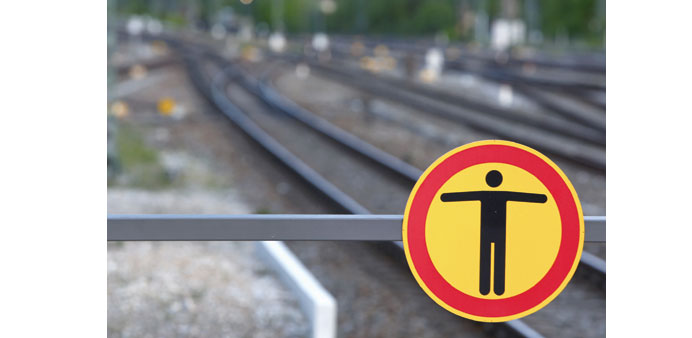A sign is pictured close to empty tracks at a train station in Munich yesterday. In a rare intervention in an ongoing wage dispute, Chancellor Angela Merkel urged state railway Deutsche Bahn and striking train drivers to put an end to a long-running conflict that industry has denounced as ‘poison’ for the German economy.
Reuters
Berlin
A railway strike set to last an unprecedented seven days caused major disruption across Germany on its first full day yesterday and pressure rose on the government to intervene by pushing the two sides into arbitration.
Economists warned that the strike, which began with freight trains on Monday then spread to passenger trains yesterday, could cost Europe’s biggest economy up to €750mn and cut second-quarter economic growth by 0.1 percentage point.
Most of the 5.5mn passengers who use Deutsche Bahn each day were forced to find alternative transport and the normally bustling rail stations from the Black Forest to the Baltic seashore were oddly empty yesterday.
Traffic jams were widespread.
Around 620,000 tonnes of freight normally transported each day – about one-fifth of Germany’s freight moves by rail – also put growing pressure on companies that rely on the extensive and normally efficient rail network to fill their order books.
The GDL union, which represents 20,000 train drivers, launched the walkout to back demands to negotiate on behalf of other railway workers such as train stewards for a 5% pay rise and a reduction in the work week to 37 hours from 39.
Deutsche Bahn, which has 200,000 employees, has offered train drivers a 4.7% pay rise plus a one-off payment of €1,000.
However, it has refused to allow the GDL to negotiate wage deals for workers in the company who do not drive trains.
Chancellor Angela Merkel has urged the two sides to accept a mediator, a proposal that gained momentum yesterday.
“If the smallest of unions like the GDL can blackmail the nation, then we need to have forced mediation,” said Wolfgang Steiger from the business wing of Merkel’s conservatives.
Even the head of Germany’s DBB federation of labour, Klaus Dauderstaedt, urged arbitration.
But GDL leader Claus Weselsky said: “We won’t sacrifice our constitutionally-protected right to strike for arbitration.”
The strike, which would be the longest in Deutsche Bahn’s 21-year-old history, is to continue until 9am on Sunday.
The walkout has hit industries reliant on rail freight such as automakers, chemical companies and steel producers.

